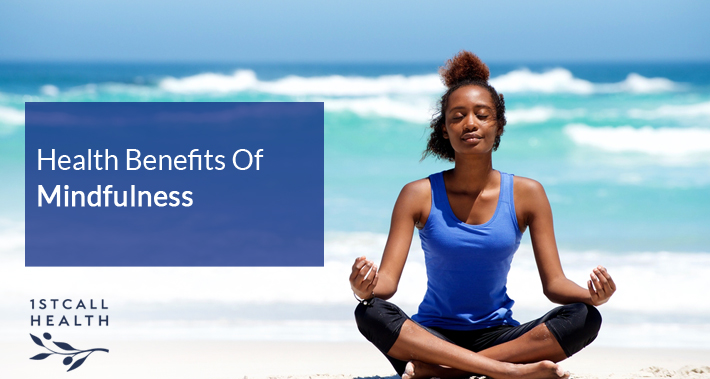
Anxiety and stress are the kinds of things that can take over your life.
They affect everything from your sleep to your immune system and more.
As a Washington DC medical clinic, we’re here to help with mental health as well as physical health concerns.
Of course, medications are always an option.
But there are also natural solutions that can help, on their own or alongside these options.
We’ve talked about other options before, such as herbal methods to soothe your anxiety, but there are other natural solutions available as well.
Today, we’re here to talk about mindfulness meditation, which has become a popular option recently.
You’ve probably heard about it before, but you may not be aware of the number of benefits it has for your health.
If you’re interested in natural remedies for your anxiety, stress, or depression, mindfulness meditation may be a great option for you.
Read on to learn more about what mindfulness can do and how you can practice it in your everyday life.
What Is Mindfulness?
Mindfulness is a type of meditation that encourages you to be aware of your thoughts, environment, bodily sensations, and feelings as they happen in the moment.
It encourages you to pay attention to these things with acceptance, so you don’t judge your thoughts and feelings against a “right” or “wrong” way to think.
Mindfulness originated in Buddhist meditation, but the type that you’ve likely heard about as a stress reduction technique is a Westernized version.
Practicing mindfulness can help you stay focused in the present and engage in the world around you in a peaceful, stress free manner.
What Are The Positive Benefits of Mindfulness?
Mindfulness has many benefits that have been backed up by scientific research.
There’s evidence that mindfulness helps a variety of health problems, like stress, pain, anxiety, insomnia, high blood pressure, and depression.
It’s also been shown to have other benefits, like decreasing burnout, improving sleep and attention, and improving diabetes control.
Let’s take a look at some of these benefits in closer detail.
1. It’s Good For Your Heart
Heart health is important for everyone, because heart disease is one of the biggest killers in North America.
The good news is that practicing mindfulness can actually reduce your likelihood of heart disease.
In fact, an article by Harvard Medical School says that people who practice mindfulness are actually significantly less likely to have a heart attack or stroke.
RELATED: How To Reduce Your Risk Of Stroke
This is because when you practice mindfulness your brain activity actually changes.
This helps to lower your breathing rate, oxygen consumption, blood pressure, heart rate, and stress hormone cortisol.
All these factors contribute to your heart health.
But even if your heart is healthy, it can still benefit from mindfulness.
Mindfulness can increase regular variations in heart rate that happen when you breathe into a healthier pattern.
These changes also give you an increased chance of surviving a heart attack if you ever have one in the future.
2. It Can Help You Sleep
Not only does mindfulness show benefits for your heart, but there’s also evidence that it can help you sleep better at night.
In 2020, researchers did a meta analysis of 18 different sleep trials and found that mindfulness meditation significantly improved sleep quality.
More research is still needed to actually know how this works, but these preliminary results are still promising.

3. It Helps Manage Stress
Stress can impact so many aspects of your life, which is why it’s so important to find ways to manage it.
Not only has mindfulness been shown to reduce stress, it’s also able to increase positive emotions.
The American Psychological association has reported on analyses of over more than 200 studies on mindfulness.
They found significant benefits on reducing stress, anxiety, depression, and addiction issues.
So if you find yourself often experiencing stress, whether it’s from work, family life, or something else, mindfulness may help reduce that stress and any related problems it might cause.
4. It’s Good For Your Immune System
It might sound a little out of left field, but it’s true.
Mindfulness has been shown to actually increase your body’s release of immune cells when you’re sick.
There has even been evidence that mindfulness helps fight cancer by improving your body’s immune response.
Outside of cancer, there’s lots of other evidence that mindfulness meditation helps your immune system.
Studies have shown improvements in inflammatory responses, wound healing, and overall immune function.
5. It Can Keep Your Mind Sharp As You Age
Aging can be a frightening topic for many people.
There are many changes that happen in both your mind and your body that you don’t necessarily have control of.
The good news is there are also many ways that you can actually exert control over these changes.
One way to exercise control over the cognitive decline associated with aging is through practicing mindfulness meditation.
Mindfulness meditation can help increase attention, which may prevent cognitive decline associated with again.
Mindfulness meditation has even been shown to help slow cognitive decline associated with Alzheimer’s disease.
Whether you’re noticing signs of cognitive decline or simply want to be prepared for the future, mindfulness meditation is a scientifically supported way to help maintain your cognitive functions as you age.
Simple Ways To Practice Mindfulness
There are so many different ways to practice mindfulness, which makes it something easy to work into your schedule.
You can try both structured and more unstructured ways to practice mindfulness, depending on how you decide to work mindfulness into your routine.
Unstructured Mindfulness Exercises
Unstructured mindfulness exercises are ways you can work mindfulness into your everyday activities and experiences.
For example, paying attention is a great mindfulness exercise.
What does that mean?
The world is busy and crazy, and it can be easy to get caught up in the fast pace.
Paying attention to your surroundings with all your senses; touch, taste, sound, sight, and smell, forces you to slow down and notice things.
It’s simple and easy, and you can do it anywhere.
Another way you can practice unstructured mindfulness is by focusing on your breathing.
This is especially important when you’re experiencing negative thoughts.
All you need to do is sit down, close your eyes, and breathe.
Pay attention to your breaths and how your body moves as you breathe.
This helps you slow down and re-center yourself while being mindful of your feelings.
Structured Mindfulness Exercises
Some people prefer more structured mindfulness exercises.
These can take up a little bit more time than unstructured exercises, but they also take you the extra step into really delving into mindfulness.
Body scan meditation is one type of mindfulness exercise that involves focusing on the sensations in your body.
To do body scan mindfulness, lie on your back with your arms at your sides, facing up.
Once you’re in position, focus on each part of your body in order from head to toe.
Pay attention to the sensations and emotions that you associate with each part of your body.
You can also do this sitting comfortably if lying on your back is challenging.
Sitting meditation is another option.
For this, you sit comfortably and focus on your breathing, much like with the unstructured breathing exercise.
In this case, if thoughts interrupt your focus on your breathing, simply make note of the thoughts or experiences and then return to focusing on your breathing.
Finally, walking meditation is another option that also gets you outside and moving.
To do this, find a quiet place and start walking slowly.
Pay attention to the sensations of walking and standing, and the movements of your muscles that keep your body balanced.
Book Your Appointment With 1stCallHeatlh Today
Mindfulness is a useful tool for both your physical and mental health and there are so many ways you can practice it.
If you feel like you need more guidance, or want to learn more about mindfulness, we’re here for you.
Book your appointment with 1stCallHealth today.
1stCallHEALTH
1331 H St NW Ste 200,
Washington, DC 20005
(202) 590-0009
– https://goo.gl/maps/MVhjkz2jqynWpsgo6
1stCallHEALTH provides affordable access to primary care services. We believe that everyone deserves affordable, high quality primary care.
Our vision is to challenge the status quo, focus on the individual, and empower personal control to change the way we think about healthcare.




